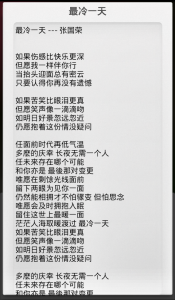使用python扫描本地音乐并下载歌词
这次这个真的是干货哦,昨晚弄了半晚上,,,,从8点吃完饭就开始写,一直到了快12点才弄好,,,新手,伤不起呀。。。。
先简单的说下吧,百度提供了一个音乐搜索的api,你想百度请求类似于
http://box.zhangmen.baidu.com/x?op=12&count=1&title=最佳损友$$陈奕迅$$$$
的地址,百度会给你返回一段xml,如下所示
This XML file does not appear to have any style information associated with it. The document tree is shown below. <result> <count>1</count> <url> <encode> <![CDATA[ http://zhangmenshiting.baidu.com/data2/music/12762845/YmRqamdua21fn6NndK6ap5WXcJlrmG1xlJhobWibmGpjk5ZtmWiZcWRjZ5lqbGyelGKWlZtubGljZ5lka2uanWSXY1qin5t1YWBmZW5ocGlhaWdnbGtqbzE$ ]]> </encode> <decode> <![CDATA[ 12762845.mp3?xcode=e6b69cf593ea22ac9d2b9314e565fc0caf85125f065ce3e0&mid=0.31929107437537 ]]> </decode> <type>8</type> <lrcid>2829</lrcid> <flag>1</flag> </url> <durl> <encode> <![CDATA[ http://zhangmenshiting2.baidu.com/data2/music/7345405/aGVnaWlmbGaeomZzrZmmnJZvmGqXbHCbl2dsZ5qXaWqSlWpsmmdrb2mXamxpbXCclGNsmW2ba25mYmxtapmZcWqTWaGemnRoX2VkbWdvaGhoZmZramluOA$$ ]]> </encode> <decode> <![CDATA[ 7345405.mp3?xcode=e6b69cf593ea22ac78e1478e78479dc19e8e4650995cb99a&mid=0.31929107437537 ]]> </decode> <type>8</type> <lrcid>2829</lrcid> <flag>1</flag> </durl> <p2p> <hash>f98b6772aa97966550ec80617879becee0233bf4</hash> <url> <![CDATA[ ]]> </url> <type>mp3</type> <size>3778335</size> <bitrate>128</bitrate> </p2p> </result>
简单的说明下,由于我们要做的只是获取到歌曲的lrc歌词地址,所以有用的只有2829这个标签。
而encode和decode里面的拼接起来就是mp3的下载地址,如本例的
http://zhangmenshiting.baidu.com/data2/music/12762845/YmRqamdua21fn6NndK6ap5WXcJlrmG1xlJhobWibmGpjk5ZtmWiZcWRjZ5lqbGyelGKWlZtubGljZ5lka2uanWSXY1qin5t1YWBmZW5ocGlhaWdnbGtqbzE$12762845.mp3?xcode=e6b69cf593ea22ac9d2b9314e565fc0caf85125f065ce3e0&mid=0.31929107437537
就是下载地址,不过音质太差,有时间在研究下这个。
继续说歌词,注意lrcid标签里面的2829
http://box.zhangmen.baidu.com/bdlrc/ 这个是百度lrc歌词存放地址,
然后本例的歌词地址是http://box.zhangmen.baidu.com/bdlrc/28/2829.lrc
看到了吧,歌词地址后面的两个数字的计算方法是在lrcid除以100所获得的整数,就是第一个数字,然后第二个数字就是lrcid,然后后面加上后缀.lrc就搞定了
获得lrc地址之后就简单了,只要请求该地址,然后将获取到的内容写入文件就ok了。
好了,大概就是这样,下面是代码
import os
import os.path
import re
import eyed3
import urllib2
import urllib
from urllib import urlencode
import sys
import os
reload(sys)
sys.setdefaultencoding('utf8')
music_path = r"E:\music"
lrc_path = r"e:\lrc"
os.remove('nolrc.txt')
os.remove('lrcxml.txt')
the_file = open('lrcxml.txt','a')
nolrc_file = open('nolrc.txt','a')
for root,dirs,files in os.walk(music_path):
for filepath in files:
the_path = os.path.join(root,filepath)
if (the_path.find("mp3") != -1):
print the_path
the_music = eyed3.load(the_path)
the_teg = the_music.tag._getAlbum()
the_artist = the_music.tag._getArtist()
the_title = the_music.tag._getTitle()
# print the_teg
# print the_title
# print the_artist
b = the_title.replace(' ','+')
# print b
a = the_artist.replace(' ','+')
#print urlencode(str(b))
if isinstance(a,unicode):
a = a.encode('utf8')
song_url = "http://box.zhangmen.baidu.com/x?op=12&count=1&title="+b+"$$"+a+"$$$$ "
the_file.write(song_url+'\n')
page = urllib2.urlopen(song_url).read()
print page
theid = 0
lrcid = re.compile('<lrcid>(.*?)</lrcid>',re.S).findall(page)
have_lrc = True
if lrcid != []:
theid = lrcid[0]
else:
nolrc_file.write(the_title+'\n')
have_lrc = False
print theid
if have_lrc:
firstid = int(theid)/100
lrcurl = "http://box.zhangmen.baidu.com/bdlrc/"+str(firstid)+"/"+theid+".lrc"
print lrcurl
lrc = urllib2.urlopen(lrcurl).read()
if(lrc.find('html')== -1):
lrcfile = open(lrc_path+"\\"+the_title+".lrc",'w')
lrcfile.writelines(lrc)
lrcfile.close()
else:
nolrc_file.write(the_title+'\n')
the_file.close()
nolrc_file.close()
print "end!"
有用第一步请求所获取到底是xml格式的,所以本来想着解析xml来获取lrcid,但是在实现过程中遇到了各种问题,别的还容易,就在这一块儿浪费的时间最长,纠结未果之后,只能改用正则表达式来获取了。。。
使用python将歌词嵌入歌曲中
以前一直用的是Google Play Music来作为手机的音乐播放器,可是现在谷歌被墙的这么厉害的,从PC上传到Google Play的音乐在手机上面同步下来的话特麻烦,索性放弃之买了大名鼎鼎的Poweramp播放器,开始使用之后瞬间就被Poweramp强大的功能所吸引住了,不愧是安卓端的音乐播放器的王者!唯美的锁屏界面,强大的均衡器功能等等。唯一美中不足的就是歌词.如果要显示歌词的话必须安装第三方软件,或者是把歌词嵌入到音乐中。所以昨天下班之后就开始研究,所幸最后终于搞定了,先上下效果图

可以看到,效果还是很不错的呢。
好了,废话不多说,下面上程序
首先,必须安装eyed3模块,还有,我所有的歌词都在E:\lrc这个路径中的
import threading
import time
import datetime
import re
import os
import eyed3
import sys
reload(sys)
sys.setdefaultencoding('utf8')
def getstr(i):
if i <10:
return "0"+str(i)
else:
return str(i)
musicpath=r'I:\music'
lrcpath=r'E:\lrc'
def deallrc(str):
mystr=re.sub(r'\[\d\d:\d\d.\d\d\]','',str)
mystr.replace('\n','')
return mystr
def checklrcfile(path,timespan):
file=open(path,'r')
mylrcstr=''
#print timespan
for line in file.readlines(100):
#errorlog(line)
if line.find(timespan)>0:
return deallrc(line)
else:
continue
return ''
def getlrcstr(lrc):
mylrcstr=''
#print lrc
for i in range(00,05):
for j in range(00,59):
for k in range(00,99):
timespan=getstr(i)+":"+getstr(j)+"."+getstr(k)
mylrcstr+=checklrcfile(lrc, timespan)
#print timespan
return mylrcstr
def getlrc(musicname):
musicname=u''.join(musicname)
musicname=musicname.encode('gb2312')
for root,dirs,files in os.walk(lrcpath):
for filepath in files:
the_path = os.path.join(root,filepath)
if (the_path.find(musicname) != -1):
print the_path
return the_path
def errorlog(path):
file=open(r'e:\nolrc.txt','a')
if path is None:
path=''
path=path+'\n'
file.write(path)
file.close()
def writetag(themusic,lrcstr):
music=eyed3.load(themusic)
lrcstr=lrcstr.decode('utf8')
lrcstr=u''.join(lrcstr)
#lrcstr=unicode(lrcstr)
music.tag.lyrics.set(lrcstr)
music.tag.save()
def dealmusic(path):
print path
the_music = eyed3.load(path)
the_teg = the_music.tag._getAlbum()
the_artist = the_music.tag._getArtist()
the_title = the_music.tag._getTitle()
#print the_title
try:
lrc=getlrc(the_title)
lrcstr=getlrcstr(lrc)
writetag(path, lrcstr)
except:
errorlog(path)
class writelrc(threading.Thread):
def __init__(self,the_path):
threading.Thread.__init__(self)
self.thepath=the_path
def run(self):
dealmusic(self.thepath)
if __name__=='__main__':
count=0
threads=[]
for root,dirs,files in os.walk(musicpath):
for filepath in files:
the_path = os.path.join(root,filepath)
if (the_path.find("mp3") != -1):
count+=1
threads.append(writelrc(the_path))
if count%10==0:
for t in threads:
t.start()
for t in threads:
t.join()
threads=[]
好了,大概就是这样,大家有什么问题可以直接提出来,我会尽快回复的。
 Bagaimana anda menambah elemen ke array python?Apr 30, 2025 am 12:19 AM
Bagaimana anda menambah elemen ke array python?Apr 30, 2025 am 12:19 AMInpython, youAppendElementStoalistusingTheAppend () method.1) useAppend () forsingLements: my_list.append (4) .2) useextend () or = formultipleelements: my_list.extend (lain_list) ormy_list = [4,5,6] .3) UseInsert () ForSpecificPositions: my_list.insert (1,5) .beaware
 Bagaimana anda menyahpepijat isu berkaitan shebang?Apr 30, 2025 am 12:17 AM
Bagaimana anda menyahpepijat isu berkaitan shebang?Apr 30, 2025 am 12:17 AMKaedah untuk debug masalah shebang termasuk: 1. Semak garis shebang untuk memastikan ia adalah baris pertama skrip dan tidak ada ruang prefixed; 2. Sahkan sama ada laluan penterjemah adalah betul; 3. Panggil jurubahasa secara langsung untuk menjalankan skrip untuk mengasingkan masalah shebang; 4. Gunakan tali atau amanah untuk mengesan panggilan sistem; 5. Periksa kesan pembolehubah persekitaran pada shebang.
 Bagaimana anda membuang elemen dari array python?Apr 30, 2025 am 12:16 AM
Bagaimana anda membuang elemen dari array python?Apr 30, 2025 am 12:16 AMPythonlistscanbemanipulaterAnseveralMethodstoremoveelements: 1) theremove () methodRemoveStHefirStoccrencrentrenceAfaspiedValue.2)
 Apakah jenis data yang boleh disimpan dalam senarai python?Apr 30, 2025 am 12:07 AM
Apakah jenis data yang boleh disimpan dalam senarai python?Apr 30, 2025 am 12:07 AMPythonlistscanstoreanydatatype, termasuk interintegers, strings, floats, booleans, otherlists, dandictionaries
 Apakah beberapa operasi biasa yang boleh dilakukan pada senarai Python?Apr 30, 2025 am 12:01 AM
Apakah beberapa operasi biasa yang boleh dilakukan pada senarai Python?Apr 30, 2025 am 12:01 AMPythonlistsSupportnumerousoperations: 1) addingElementSwithAppend (), extend (), andInsert ()
 Bagaimana anda membuat tatasusunan pelbagai dimensi menggunakan numpy?Apr 29, 2025 am 12:27 AM
Bagaimana anda membuat tatasusunan pelbagai dimensi menggunakan numpy?Apr 29, 2025 am 12:27 AMBuat tatasusunan pelbagai dimensi dengan numpy dapat dicapai melalui langkah-langkah berikut: 1) Gunakan fungsi numpy.array () untuk membuat array, seperti Np.Array ([[1,2,3], [4,5,6]]) untuk membuat array 2D; 2) Gunakan np.zeros (), np.ones (), np.random.random () dan fungsi lain untuk membuat array yang diisi dengan nilai tertentu; 3) Memahami sifat bentuk dan saiz array untuk memastikan bahawa panjang sub-array adalah konsisten dan mengelakkan kesilapan; 4) Gunakan fungsi np.reshape () untuk mengubah bentuk array; 5) Perhatikan penggunaan memori untuk memastikan bahawa kod itu jelas dan cekap.
 Terangkan konsep 'penyiaran' dalam array Numpy.Apr 29, 2025 am 12:23 AM
Terangkan konsep 'penyiaran' dalam array Numpy.Apr 29, 2025 am 12:23 AMBroadcastinginginnumpyisamethodtoperformoperationsonarraysofdifferentshapesbyautomaticallyaligningthem.itsImplifiescode, enhancesreadability, andboostsperformance.here'showitworks: 1) smallerarraysarepaddedwithonestomatchdimensions.2) CompatibeSt
 Terangkan cara memilih antara senarai, array.array, dan array numpy untuk penyimpanan data.Apr 29, 2025 am 12:20 AM
Terangkan cara memilih antara senarai, array.array, dan array numpy untuk penyimpanan data.Apr 29, 2025 am 12:20 AMForpythondatastorage, chooselistsforflexabilityWithMixedDatatypes, array.arrayformemory-efficienthomogeneousnumericaldata, andnumpyarraysforadvancednumericalcomputing.listsareversatileButlessefficefientfientfientfientfientfientfientfientfientfientfientfientforydodeSforayDataSetSetShiSforayDataSetSetShiSforayDataSetSetShiSforayDataSetSetShoFficeSforaydataSetShoSforayDataSetsforayDataSetsforayDataSetsforaydataSetShiSforayDodeSforayDodeSforaydataSetRaydataSetRaydataSetRaydataSet


Alat AI Hot

Undresser.AI Undress
Apl berkuasa AI untuk mencipta foto bogel yang realistik

AI Clothes Remover
Alat AI dalam talian untuk mengeluarkan pakaian daripada foto.

Undress AI Tool
Gambar buka pakaian secara percuma

Clothoff.io
Penyingkiran pakaian AI

Video Face Swap
Tukar muka dalam mana-mana video dengan mudah menggunakan alat tukar muka AI percuma kami!

Artikel Panas

Alat panas

Muat turun versi mac editor Atom
Editor sumber terbuka yang paling popular

EditPlus versi Cina retak
Saiz kecil, penyerlahan sintaks, tidak menyokong fungsi gesaan kod

SublimeText3 versi Mac
Perisian penyuntingan kod peringkat Tuhan (SublimeText3)

Pelayar Peperiksaan Selamat
Pelayar Peperiksaan Selamat ialah persekitaran pelayar selamat untuk mengambil peperiksaan dalam talian dengan selamat. Perisian ini menukar mana-mana komputer menjadi stesen kerja yang selamat. Ia mengawal akses kepada mana-mana utiliti dan menghalang pelajar daripada menggunakan sumber yang tidak dibenarkan.

Penyesuai Pelayan SAP NetWeaver untuk Eclipse
Integrasikan Eclipse dengan pelayan aplikasi SAP NetWeaver.






